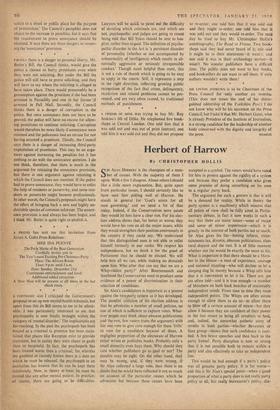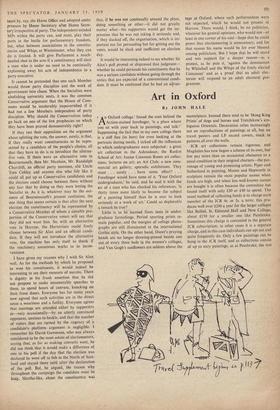Herbert of Harrow
By CHRISTOPHER HOLLIS SIR ALAN HERBERT is the champion of a num- ber of causes. With the majority of them I agree. With a few I disagree. About others I should like a little more explanation. But, quite apart from particular issues, I should certainly like to have seen him polling well at Harrow. He stands in general for 'God's scorn for all men governing,' and we need a bit of that today. Indeed, if the Conservatives were astute they would let him have a clear run. For his elec- tion address shows that, for better or worse, they would have his vote on all the major issues, while they would strengthen their position enormously in the country if' they could say, 'We understand that this distinguished man is not able to enlist himself formally in our ranks. We respect his independence, but we think it for the good of Parliament that he should be elected. We will help him all we can, while making no demands upon him. Who after that can say that we are a Whip-ridden party?' After Bournemouth and Southend the Conservatives need to produce some evidence of a power of discrimination in their selection of candidates.
Sir Alan's candidature is important as a protest against the two:party system as it has developed. The pundits' criticism of his election address is that he advocates a number of small policies, no one of which is sufficient to capture votes. What- ever people may think about obscene publications and the-rest, few voters (runs the argument) with but one vote to give care enough for these 'frills'• to vote for a candidate because of them. A negligible proportion of the electorate of Harrow either writes or publishes books, Probably only a small minority even buys them. Why should they care whether publishers go to gaol or not? The pundits may be right. On the other hand, they may be wrong, and, if they were wrong, if Sir Alan collected a large vote, then there is no doubt that he would have collected it not so much on account of the particular causes which he advocates but because these causes have been accepted as a symbol. The voters would have voted for him in protest against the rigidity of a system and because they prefer a candidate who gives some promise 'of doing something on his own to a regular party hack.
The argument for such a gesture is that it will be a demand for reality. While in theory the party system is a machinery which ensures that all points of view shall be fully aired in Parlia- mentary debate, in fact it now works in such a way that there are many issues—some of major and some of minor importance—which it is greatly to the interest of both parties not to touch. Sir Alan gives his list—betting reform, enter- tainments tax, divorce, obscene publications, elec- toral deposit and the rest. It is of little moment whether our list would be exactly the same as his. What is important is that there should be a NI em- ber in the House—a man, of experience, courage and national standing—who will decline to let a sleeping dog lie merely because a Whip tells him that it is convenient to let it lie. There are, we are often told—and it is true enough—a number of Members on both back benches of reasonably independent minds. From time to time they raise independent points. The Whips are often astute enough to allow them to do so—to allow them to blow off a certain amount of steam—but they allow it because they are confident of their power in the last resort to bring all revolters to heel, and, indeed, the somewhat pathetic story of revolts in both parties—whether Bevanites or Suez group—shows that such confidence is justi- fied. A few brave speeches and then back to the party kennel. Party 'discipline is now so strong that it is not possible both to remain within a party and also effectively to take an independent line.
This would be bad enough if a party's policy was all genuine party policy. It is far worse— and this is Sir Alan's special point—when a 'good proportion of what a party does is not really party policy at all, but really bureaucrat's policy, dic- tated by, say, the Home Office and adopted under pressure by Home Secretary after Home Secre- tary irrespective of party. The independent-minded MPs within the party can, and must, play their parts in the battle for parliamentary freedom, but, what between associations in the constitu- encies and Whips at Westminster, what they can do is limited. It will give Parliament a much- needed shot in the arm if a constituency will elect a man who is under no need to be continually explaining away his acts of independence to a party executive.
It cannot be pretended that one such Member would throw party discipline and the work of government into chaos. When the Socialists were abolishing university seats, it was the common Conservative argument that the House of Com- mons would be intolerably impoverished if it had not a few Members independent of party discipline. Why should the Conservatives today go back on one of the few prophecies on which they have been proved demonstrably right?
If they rest their opposition on the argument about splitting the vote, the answer, surely, is that, if they really want constituencies to be repre- sented by a candidate of the people's choice, all that they have to do is to introduce the alterna- tive vote. if there were an alternative vote in Bournemouth, then Mr. Nicolson, Mr. Randolph Churchill, an official party nominee, old Uncle Tom Cobley and anyone else who felt like it could all put up as Conservative candidates and the electors could choose between them without any fear that by doing so they were letting the Socialist in. As it is, whatever may be the out- come of Bournemouth's present, confusion, the one thing that seems certain is that after the next election the constituency will be represented by a Conservative Member of whom a sizeable pro- portion of the Conservative voters will say that they did not want him. So, with an alternative vote in Harrow, the. Harrovians could freely choose between Sir Alan and an official candi- date. If they will not introduce the alternative vote, the machine has only itself to thank if the machinery sometimes works to its incon- venience.
I have given my reasons why I wish Sir Alan well. As for the methods by which he proposed to woo his constituents, it would indeed be interesting to see their measure of success. There is dignity in his frank assertion that he did not propose to make innumerable speeches to them, to spend hours of canvass, knocking on their front doors. Everyone has for many years now agreed that such activities are in the direct sense a weariness and a futility. Everyone agrees that meetings are attended either by supporters or—very occasionally—by an utterly convinced opponent, anxious to heckle, and that the number of voters that are turned by the cogency of a candidate's, platform argument is negligible. I remember Sir David Gammans, who was always considered to be the most astute of electioneerers, saying that,' as far as making converts went, he did not think that it would make a difference of one to his poll if the day that the election was declared he went off to fish in the North of Scot- land and stayed there until after the declaration of the poll. But, he argued, the reason why throughout the campaign the candidate must be busy, Martha-like, about the constituency was that, if he was not continually around the place, doing something or other—it did not greatly matter what—his supporters would get the im- pression that he was not taking it seriously and, if they slacked off, the organisation, which is im= portant not for persuading but for getting out the votes, would be slack and inefficient on election day.
It would be interesting indeed to see whether Sir Alan's poll proved or disproved that judgment— whether he could perivade his constituents that he was a serious candidate without going through the antics that are expected of a conventional candi- date. It must be confessed that he had an advan- tage at Oxford, where such performances were not expected, which he would not possess at Harrow. There would, I think, be no politician, whatever his general opinions, who would not—at least in one corner of his soul—hope that he could prove that electioneering is unnecessary, and for that reason his name would be for ever blessed among politicians. But I hope th4t he will stand and win support for a deeper reason—as a protest, as he puts it, 'against the domination by Whitehall and the Whips of the freely elected Commons' and as a proof that an adult elec- torate will respond to an adult electoral pro- gramme.











































 Previous page
Previous page